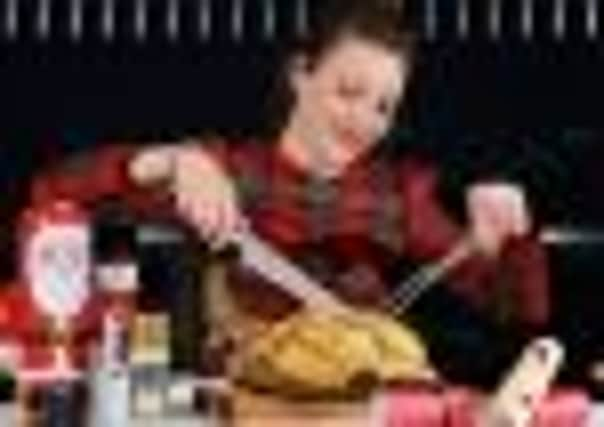The Midas touch for Christmas gourmets


The slightly less traditional centrepiece for the most important meal of the year will be a golden turkey, produced by spraying on an edible golden coating.
The food spray has become the surprise sell out hit at luxury store Harvey Nichols, in Edinburgh, where initial supplies sold out in the first week, despite a hefty price tag of £24.95 for a small 100ml can. The spray, which also sold out in the company’s stores in London and Leeds, also comes in silver, and can be used on roasted turkeys and chickens, as well as steaks and other cuts of meat.
Advertisement
Hide AdAdvertisement
Hide AdCarol Dawson, food market and wine shop manager at Harvey Nichols Edinburgh, which has opened a pop-up shop in the city’s Multrees Walk, said: “It took us a little bit by surprise just how popular it was, particularly given the price. It’s quite an expensive thing for people to buy just to try out. But it’s an indicator of how popular it is, that people are willing to pay that much in order to give it a go.”
The Esslack Food Finish Spray, which is made in Germany by Deli Garage and is also available from the firm online, can also be used on sweet treats including chocolate cakes, cupcakes, muffins and petits fours. It has also become a popular product in Germany, where it is used on a wide variety of savoury foods from pretzels to tomatoes. The company claims that the spray is completely tasteless so that it does not affect the flavour of the food on which it is sprayed. It is made of a combination of ethyl alcohol, food additives and colourings.
Mary McGowne, founder of the Scottish Style awards, said she thought a gold turkey would be a stylish addition to the festive table. “I think it sounds like a fabulous idea. It’s the kind of thing that will add real glitz and glamour to any Christmas,” she said. “It’s the one day of the year when the family can get together and people can go overboard on style and food, and I think having something like a gold turkey is just a great reflection of that.”
However, despite the sales rush, not everyone was convinced that golden turkeys are the future.
“It’s going to appeal to people who either don’t know how to roast their turkey properly and are trying to cover up their mistakes, or to people who have far too much money,” said John Quigley, chef and owner of the Red Onion Bistro in Glasgow.
Tom Carr, of Millhill Free Range Turkeys, who supplies around 600 free range bronze and white turkeys each Christmas to restaurants and homes from his farm outside Dumfries, agreed.
“I would advise against using something like this,” he said. “We take a lot of time and effort to produce a turkey that has its own golden look so that when it comes out of the oven and you take the foil off it has a yellowy golden colour anyway. I certainly wouldn’t use it. Coloured chocolates are OK, but when you start colouring meat you’re taking it a bit too far.”
But Dawson said the spray would appeal to those looking for something a bit different for their Christmas spreads.
Advertisement
Hide AdAdvertisement
Hide Ad“People are definitely a bit more adventurous than they’ve been in the past,” she said. “They like the traditional elements of Christmas but they also want to do something out of the ordinary that’s going to surprise their guests and give them a talking point. Presentation is half the battle.”
Quigley said that there was an increasing focus on presentation in cooking both in restaurants and at home, inspired by chefs such as the Fat Duck’s Heston Blumenthal, who regularly colours and disguises foods such as his “meat fruit” – which uses meat paté to make a dish that resembles an apple.
“The trick, ultimately, is to get the flavour right,” said Quigley.
“Christmas dinner in particular is notoriously difficult; it’s a very hard meal to get right. For that reason I suppose it also becomes important to get the table right too. Dressing the table is really important at Christmas because the plate of food on its own isn’t pretty. If it looks good you assume it’s going to taste good. But it’s got to taste good – that’s the bottom line.”
Turkey is still Britain’s favourite Christmas dish, despite the growing popularity of other roasted birds such as goose and pheasant. Last year, ten million turkeys were sold in the run-up to Christmas with 87 per cent of British consumers saying Christmas wouldn’t be the same without turkey.